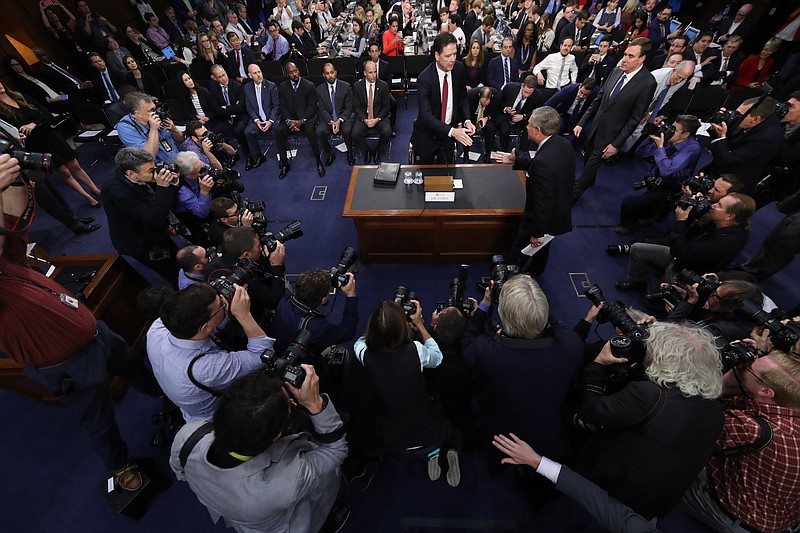Our country is under attack, and our president is worried only about himself.
Russians have hacked into political and election contractors' software databases and sent phishing emails to state election organizations in efforts to meddle with our free elections and democracy.
What questions do you want our president to be asking? What actions do you want him to be taking?
Your answers most likely will not mesh well with what Americans learned in the riveting three-hour testimony of fired FBI director James Comey before the Senate Intelligence Committee on Thursday. Until President Donald Trump fired him, Comey headed up the investigation of those matters.
First let's set the table - in Comey's own words - about why this is important.
"We have this big messy wonderful country where we fight with each other all the time. But nobody tells us what to think, what to fight about, what to vote for except other Americans. But we're talking about a foreign government that's using technical intrusion, lots of other methods, to shape the way we think, we vote, we act. That is a big deal. And people need to recognize it. It's not about Republicans or Democrats. They're coming after America, which I hope we all love equally. They want to undermine our credibility in the face the world. They think that this great experiment of ours is a threat to them. So they're going to try to run it down and dirty it up as much as possible. That's what this is about and they will be back. Because we remain - as difficult as we can be with each other, we remain that shining city on the hill. And they don't like it."
You likely won't see that in most of today's bullet-point top testimony quotes. Nor will you see much about Comey's startling recollection that President Trump never once asked him in some nine meetings or phone calls, what he or our government should be doing to stop the Russian threat.
Instead, Trump made requests and suggestions that Comey drop the probe into fired National Security Adviser Michael Flynn, and tell the public that he - the president - was not personally under investigation.
While that clumsy but clear effort to obstruct justice (whether or not Trump understands the concept) is concerning, far more frightening is the yawning lack of our president's interest in Russia's obvious attack and assault on our tradition of democracy and free elections.
Sen. Martin Heinrich, D-N.M., honed in on it, after asking Comey to explain why there was an investigation in the first place, considering that Trump has repeatedly described Russian involvement in the U.S. election cycle as a hoax and fake news.
COMEY: "There should be no fuzz on this whatsoever. The Russians interfered in our election during the 2016 cycle. They did with purpose. They did it with sophistication. They did it with overwhelming technical efforts. It was an active measures campaign driven from the top of that government. It is a high confidence judgment of the entire intelligence community and the members of this committee have seen the intelligence. It's not a close call. That happened. That's about as unfake as you can possibly get. It is very, very serious. "
HEINRICH: "Did the president in any of those interactions that you've shared with us today ask you what you should be doing or what our government should be doing or the intelligence community to protect America against Russian interference in our election system?"
COMEY: I don't recall a conversation like that.
HEINRICH: Never?
COMEY: No.
Heinrich persisted, asking if Comey had any interactions with the president that suggest he was taking that Russian hostile action seriously.
COMEY: "I don't remember any interactions with the president other than the initial briefing on January the 6th. I don't remember - could be wrong, but I don't remember any conversations with him at all about that."
Later, in answer to another question about this from Sen. Joe Manchin, D-W.V., Comey expanded on particulars of that initial briefing. He said the president asked what he found and what the FBI's sources were and what their confidence level was.
In meetings later, Trump talked to Comey at some length suggesting he somehow pledge his loyalty, give Flynn a pass and tell the public that the president himself was not under investigation.
Comey acknowledged that he told the president that he was not personally under investigation in connection with that Russian interference.
But the campaign was and is, and Flynn was a central figure in that campaign. Flynn later served as Trump's National Security Adviser for nearly a month before he was forced to resign for lying to the vice president about his conversations with the Russians over Obama's sanctions against them for meddling in the election. Now Flynn is under criminal investigation and has asked for immunity.
Maine Sen. Augus King asked Comey if closing out the Flynn investigation would have impeded the overall Russian investigation.
"No. Well, unlikely, except to the extent - there is always a possibility if you have a criminal case against someone and squeeze them, flip them and they give you information about something else," Comey said.
President Trump is the same man who as a candidate during the campaign looked straight into the cameras at a news conference to invite Russia to find "missing" Hillary Clinton emails - emails that were not missing at all.
President Trump, in his conversations with the nation's top cop heading up the Russia probe, instead seemed concerned only about a potential witness and that top cop's sources.
This is beyond sad. It's horrifying.
